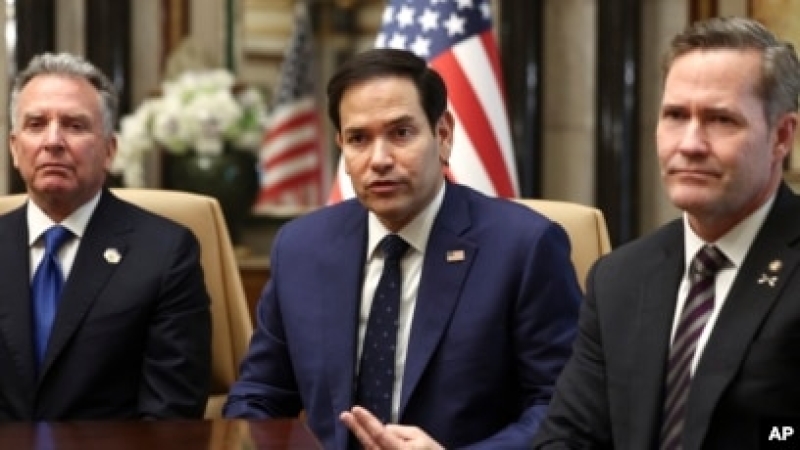- Power generation at Payra Thermal Power Plant 1st unit starts after a month |
- Irregularities, injustice will no longer be accepted in politics: Jamaat Ameer |
- 2 arrested in Jhenaidah for allegedly selling madrasa student |
- Koko’s wife campaigns for Tarique in Dhaka-17 |
- Bangladeshi Expats Cast 4.58 Lakh Postal Votes |
Rubio: US Seeks Fair, Sustainable End to Russia-Ukraine War

U.S. Secretary of State Marco Rubio emphasized on Tuesday that the United States is working toward a "fair" and "sustainable" resolution to end Russia’s ongoing war on Ukraine. However, he stressed that both Moscow and Kyiv must make significant concessions for peace to be achieved.
Rubio’s comments came after a high-level meeting in Saudi Arabia, where U.S. officials spent over four hours discussing potential solutions with Russian Foreign Minister Sergey Lavrov and his team. This marked the first direct effort toward resolving the war and improving U.S.-Russia relations in recent years.
“The goal is to end the conflict in a way that is fair, enduring, and acceptable to all involved,” Rubio told reporters, though Ukrainian and European representatives were notably absent from the talks.
Ukrainian President Volodymyr Zelenskyy voiced his displeasure over being excluded from the discussions, a sentiment echoed by former U.S. President Donald Trump. “You’ve been there for three years,” Trump remarked regarding Ukraine’s leadership. “You should have never started it.”
In response, Zelenskyy delayed a planned visit to Saudi Arabia this week, likely to distance himself from the ongoing negotiations. He is expected to meet U.S. envoy Keith Kellogg in the coming days for separate talks.
Rubio expressed confidence that Russia is now willing to engage in serious peace negotiations, with Lavrov sharing a similarly optimistic view. "We weren’t just listening to each other, but we heard each other," Lavrov said, suggesting improved mutual understanding between the two sides.
The war, which has resulted in tens of thousands of casualties, remains Europe’s deadliest conflict since World War II. In response to the meeting, U.S. and Russian officials agreed to create high-level teams focused on finding a path to peace. State Department spokeswoman Tammy Bruce called the talks “an important step forward.”
Rubio noted that for peace to hold, both Ukraine and European nations must be involved in the talks. He also indicated that a cessation of hostilities would open up "extraordinary opportunities" for U.S.-Russia cooperation on trade and global issues.
National Security Adviser Mike Waltz and Middle East envoy Steve Witkoff also participated in the discussions, emphasizing that any peace agreement would need to address territorial issues and security guarantees for both Russia and Ukraine.
"This needs to be a permanent end to the war, not a temporary solution," Waltz said.
Currently, Russia controls approximately a fifth of Ukraine’s territory, including Crimea and regions seized by pro-Russian separatists. Moscow initially hoped for a swift victory, but stiff Ukrainian resistance has led to prolonged fighting, with both sides regularly engaging in aerial bombardments.
Zelenskyy has consistently demanded that Ukraine’s 2014 borders be restored, but U.S. officials have suggested that this may be an unrealistic expectation for a negotiated peace. Similarly, the goal of Ukraine joining NATO, a key Western military alliance, is seen as unfeasible under current circumstances.
The Rubio-Lavrov talks also laid the foundation for broader U.S.-Russia discussions. Bruce noted that both sides plan to establish a mechanism to address bilateral tensions and explore future cooperation once the war ends.
European leaders have expressed concern over the exclusion of Ukraine from these discussions, with many stressing that any peace agreement must involve Ukrainian input. French President Emmanuel Macron recently convened a meeting of European leaders to discuss defense spending and potential security guarantees for Ukraine, while there was division over the idea of deploying peacekeepers to Ukraine.
While nations like Britain and Sweden have shown openness to peacekeepers, German Chancellor Olaf Scholz deemed the proposal premature.

